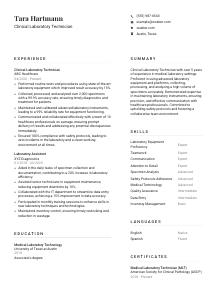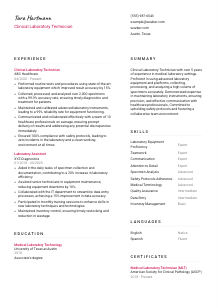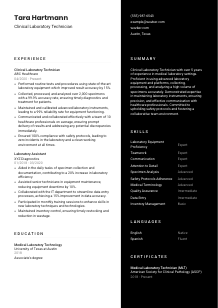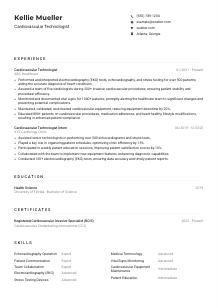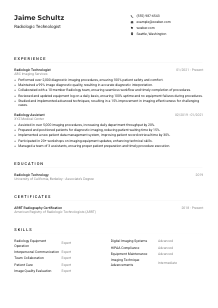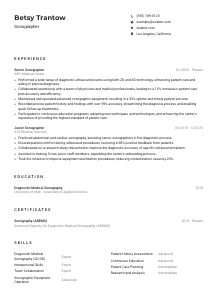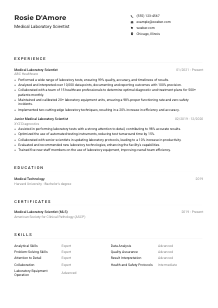Clinical Laboratory Technician Resume Example
Unveiling medical mysteries, but your resume feels like a diagnostic conundrum? Probe into this Clinical Laboratory Technician resume example, delving deep with Wozber free resume builder. It'll demonstrate how you can present your lab-prowess to align with job prerequisites, ensuring your career stays in a state of prime wellness!
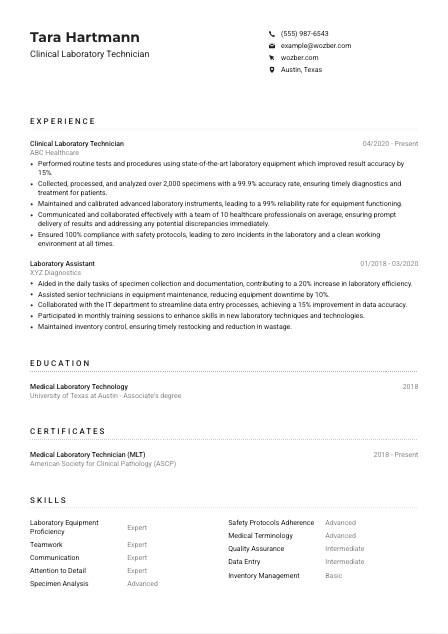
How to write a Clinical Laboratory Technician resume?
Greetings, aspiring Clinical Laboratory Technician! If you're looking to stand out in the competitive field of laboratory science, your resume needs to shine brighter than a freshly polished petri dish. In this guide, crafted with the power of Wozber's free resume builder, we'll help you align your resume perfectly with your dream job's requirements. Leveraging an ATS-friendly resume template and refining it with the ATS resume scanner, let's embark on this journey together to craft a resume that gets noticed!
Personal Details
The Personal Details section may seem straightforward, yet it's the opening volley of your resume. Here, we'll explore crafting this section with precision, ensuring it serves as a beacon calling out to hiring managers in the clinical laboratory field.
1. Branding with Your Name
Your name is the banner under which your professional accomplishments march. Opt for a clear, professional font, making it prominent to etch your name into the hiring manager's memory. Remember, your name is the pulse of your professional identity. Let it stand proud.
2. Tying in the Position
Directly below your name, include the job title you're targeting: "Clinical Laboratory Technician." This immediately signals to hiring managers that your resume is carefully tailored, aligning your goals with the job at hand. Echoing the job title builds that first bridge of relevance.
3. Ensuring Contact Clarity
Provide a contact number and email address that reflect professionalism. Avoid quirky email addresses; a combination of your first and last name usually does the trick. Double-check these details. An error here could mean a missed opportunity. Contact precision is your lifeline to the next step in your career.
4. Location Specifics
By stating "Austin, Texas" prominently, you align with one of the job's key requirements, signaling no logistical barriers to your employment. This detail reassures employers of your readiness and availability, acting as a compass that points directly to you.
5. Leveraging Professional Links
Including a LinkedIn profile or personal website can fortify your first impression. Ensure these profiles are polished and mirror the professionalism of your resume. Think of them as digital handshakes extending beyond the paper.
Takeaway
Craft your Personal Details with attention and care, ensuring it introduces you with professionalism and clarity. This section is the gateway to your professional narrative, laying the foundational stones of your first impression. Get it right, and the rest of your resume will follow gracefully.





Experience
The Experience section is your professional battleground, where you showcase your victories and strengths. It's time to align your past roles with the DNA of a Clinical Laboratory Technician, proving your worth with every bullet point.
- Performed routine tests and procedures using state‑of‑the‑art laboratory equipment which improved result accuracy by 15%.
- Collected, processed, and analyzed over 2,000 specimens with a 99.9% accuracy rate, ensuring timely diagnostics and treatment for patients.
- Maintained and calibrated advanced laboratory instruments, leading to a 99% reliability rate for equipment functioning.
- Communicated and collaborated effectively with a team of 10 healthcare professionals on average, ensuring prompt delivery of results and addressing any potential discrepancies immediately.
- Ensured 100% compliance with safety protocols, leading to zero incidents in the laboratory and a clean working environment at all times.
- Aided in the daily tasks of specimen collection and documentation, contributing to a 20% increase in laboratory efficiency.
- Assisted senior technicians in equipment maintenance, reducing equipment downtime by 10%.
- Collaborated with the IT department to streamline data entry processes, achieving a 15% improvement in data accuracy.
- Participated in monthly training sessions to enhance skills in new laboratory techniques and technologies.
- Maintained inventory control, ensuring timely restocking and reduction in wastage.
1. Unpack the Job Requirements
Begin with a forensic analysis of the job posting. Highlight keywords and required experiences that resonate with your own. This preparatory work is akin to preparing samples for testing - you're identifying the elements that need to be showcased.
2. Organizing Your Professional Journey
List your experiences in reverse chronological order, spotlighting your most recent and relevant positions first. For each role, include your title, the company, and your period of employment. Think of each entry as a test result that contributes to a diagnosis - in this case, your fit for the job.
3. Crafting Your Achievements
Under each role, detail accomplishments that align with the job's demands, using action verbs to convey movement and impact. For instance, "Performed routine tests improving result accuracy by 15%." These statements are the reactive agents, showing the effect of your contributions in previous roles.
4. The Power of Numbers
Quantification adds credibility. If you've processed a high volume of specimens or contributed to efficiency improvements, highlight these achievements with numbers. This approach adds a layer of validation to your experience, akin to citing the concentration in a chemical assay.
5. Focusing on Relevance
This section is not an exhaustive list of your job duties but a curated collection of your most impactful contributions. Prioritize experiences that directly translate to the Clinical Laboratory Technician role. Concentrate your content like you would a specimen sample, distilling it to its most vital components.
Takeaway
Think of your experience section as the core of your professional identity, reflecting a concentrated blend of your skills and accomplishments. By precisely aligning your past roles with the Clinical Laboratory Technician requirements, you're not just seeking a job; you're advocating for your place within a professional community. Drive home the impact you've made and can continue to make.
Education
Within the realm of laboratory technology, your educational background is not just a credential; it's a testament to your foundational knowledge and commitment to the field. Let's ensure your Education section speaks volumes to hiring managers, aligning perfectly with your target role.
1. Isolating the Prerequisites
Decipher the job description to understand the educational criteria precisely. For a Clinical Laboratory Technician, this usually involves an Associate's or Bachelor's degree in Medical Laboratory Technology or a related field. Highlighting this upfront ensures a seamless match with the job's specifications.
2. Simplifying the Format
This section should be a clean, easy-to-read list of your educational achievements, including the degree obtained, the institution, and your graduation year. Think of it as labeling samples – clear and to the point, leaving no room for interpretation errors.
3. Detailing Your Degree
If your degree directly corresponds with the job requirement, make it known. This is not the place for modesty. Showcasing a degree in Medical Laboratory Technology explicitly aligns with the employer's expectations, adding a layer of specificity akin to a targeted serum.
4. Mentioning Relevant Courses
Particularly for early-career professionals, listing relevant courses can be beneficial. If you've completed specialized coursework in areas pertinent to a Clinical Laboratory Technician, such as biochemistry or microbiology, include these to underscore your preparedness and passion for the field.
5. Citing Additional Achievements
If applicable, highlight any educational milestones such as honors, relevant extracurricular engagements, or significant projects. These add depth to your academic profile, much like a multifaceted test reveals more than a single-result assay.
Takeaway
The Education section of your resume is a piece of your professional DNA, encoding your foundational skill set and knowledge base. It must resonate with the job's educational requirements, showcasing your qualifications as precisely as lab results match a diagnosis. Let your achievements stand as a proud testament to your commitment to your career.
Certificates
In the clinical laboratory environment, certifications aren't just accolades; they're affirmations of your specialized expertise and commitment to ongoing professional development. Let's navigate the Certificate section to emphasize your qualifications dynamically.
1. Highlighting Essential Credentials
First, ensure your resume reflects any specific certifications required by the job description, such as the MLT (Medical Laboratory Technician) certification from ASCP or AMT. Listing these prominently reflects direct compliance with the job's requirements, akin to matching a blood type for a transfusion – it has to be precise.
2. Selecting Significant Certificates
Prioritize your certifications based on their relevance to the job at hand. This isn't about showcasing everything but rather highlighting what makes you the most suitable candidate for this specific role. It's about quality, not quantity, similar to selecting reagents for a critical assay.
3. Detailing with Dates
If your certifications have expiration dates or are particularly current, include these details. This shows active engagement in your field, much like keeping lab equipment calibrated ensures accuracy in testing.
4. Committing to Continuous Learning
The clinical field evolves rapidly, and so should your knowledge. Indicate your dedication to continual learning and staying abreast of advancements, demonstrating a proactive approach to your professional development. It shows you're as dynamic and adaptable as the field requires.
Takeaway
Your certifications are like specialized tools in your professional kit, essential for performing your role with precision and expertise. By carefully selecting and presenting your certifications, your resume not only meets the requirements but also showcases your dedication to excellence in the field of laboratory science. Stay certified, stay sharp, and let your resume reflect your unwavering commitment to professional growth.
Skills
In the landscape of clinical laboratory work, your skills section is your inventory list - it showcases the tools and techniques at your disposal. Crafting this section with care will ensure hiring managers see you as the go-to technician, equipped with the right skills for precise diagnostic work.
1. Extracting Job-Specific Skills
Start with a deep dive into the job posting, identifying both the hard and soft skills mentioned. Skills such as "Laboratory Equipment Proficiency" and "Specimen Analysis" are your hard skills, while "Communication" and "Teamwork" are valuable soft skills. This analysis is like preparing a reagent – essential for the next step.
2. Curating Your Skill Set
Match the job description's skills with your own, focusing on those that align most closely. Picture this as calibrating your equipment; you want to ensure the most accurate and relevant results. Your chosen skills should echo the job requirements, proving you have the precise toolkit for the job.
3. Structuring with Precision
Avoid overcrowding this section. Prioritize and organize your skills in a manner that makes them easy to scan and understand. Like in sample organization, clarity and accessibility are key. You're showcasing a concise, curated collection of your professional capabilities.
Takeaway
Think of your skills section as a well-organized lab bench, with each tool and instrument placed with intention for optimal performance. By neatly arranging your most relevant skills, you ensure hiring managers can quickly see your professional worth. Keep this section tidy, relevant, and reflective of the job's needs, and you'll set yourself apart as the Clinical Laboratory Technician of choice.
Languages
While the core of a Clinical Laboratory Technician's role revolves around technical proficiency, the ability to communicate effectively across languages can enhance your professional appeal in a diverse workplace. In this section, let's outline how to highlight your linguistic prowess, tailoring it to complement your scientific skills.
1. Identifying Language Requirements
If the job listing mentions a need for proficiency in specific languages, like "Proficiency in English is key," make this your headline act. Listing English as a "Native" skill immediately ticks a significant box in the job requirements, setting a positive tone for your linguistic capabilities.
2. Featuring Your Language Portfolio
After addressing any specific requirements, list other languages you're proficient in. This not only showcases your versatility but in a field as collaborative as clinical laboratory work, demonstrates your readiness to engage with a diverse team or patient base.
3. Clarifying Proficiency Levels
Be transparent about your proficiency levels, using terms like 'Native,' 'Fluent,' 'Intermediate,' and 'Basic.' This honesty ensures clear communication and sets realistic expectations, mirroring the importance of precision in lab work.
4. Assessing Your Role's Linguistic Demands
For positions within multicultural organizations or locations, a rich linguistic portfolio can be an incredible asset. Even if it's just a 'Basic' understanding, every language you know opens more doors and creates more connections.
5. Constant Language Development
The role of a Clinical Laboratory Technician can evolve, and with it, the linguistic demands. Stay engaged in learning and improving your language skills, much like you would stay up to date with the latest laboratory practices. View languages as tools for broadening your professional and personal horizons.
Takeaway
In the detailed world of clinical laboratory work, clear communication can be just as crucial as technical skill. By judiciously presenting your language abilities, you offer a fuller picture of your professional versatility. Languages are not just about communication; they're about connection. Embrace your linguistic skills as an integral component of your professional identity, ready to bridge gaps and build relationships in your clinical laboratory career.
Summary
The summary is your handshake, your first impression, and your elevator pitch all wrapped into one. For a Clinical Laboratory Technician, this section must distill the essence of your skills, experience, and goals into a compelling and concise introduction. Let's pinpoint how to articulate your professional identity captivatingly.
1. Digesting the Job Description
Start by absorbing every detail of the job requirements. Understand the key skills and experiences the employer is seeking. Your summary is the first response to this 'call,' introducing you as the answer to their search.
2. Opening with Impact
Begin with a strong statement that positions you within your field: 'Dedicated Clinical Laboratory Technician with over 5 years of experience...' This immediate identification sets the stage, providing a clear lens through which to view your subsequent details.
3. Mirroring the Role's Need
Weave in skills and achievements that directly answer the job's call. Mention your proficiency with laboratory equipment, your attention to detail, and any significant accomplishments such as high accuracy rates in specimen analysis. It's about painting a picture where you're wearing the lab coat already.
4. Ensuring Brevity and Punch
Your summary should be a potent blend of your professional essence, not an expansive recounting. Aim for 3-5 lines that leave the reader intrigued and eager to learn more about you. It's the teaser that invites further exploration into the narrative of your resume.
Takeaway
In crafting your summary, you're distilling your professional journey into its most potent, compelling essence. This snippet of text sets the tone for the detailed resume that follows, establishing you firmly as a Clinical Laboratory Technician poised for new challenges. Let it reflect your dedication, your expertise, and your readiness to contribute to your chosen field.
Launching Your Clinical Laboratory Technician Journey
You've now gone through a meticulous process to tailor a resume that not only meets but exceeds the expectations of a Clinical Laboratory Technician position. Remember, crafting a resume with Wozber's free resume builder, including its ATS resume scanner for keyword optimization, ensures that your application is not just seen but truly stands out. Your resume is a reflection of your professional identity; let it speak volumes, and may it open the doors to your next great adventure in the world of clinical laboratory science.
Your dedication and expertise have prepared you for this moment. It's time to step confidently into your future!

- Associate's or Bachelor's degree in Medical Laboratory Technology or a related field.
- Certification as a Medical Laboratory Technician (MLT) from ASCP or AMT.
- Minimum of 2 years of hands-on experience in a clinical laboratory setting.
- Proficiency in using laboratory equipment and platforms.
- Strong analytical, communication, and teamwork skills.
- Proficiency in English is key.
- Must be located in Austin, Texas.
- Perform routine tests and procedures using laboratory equipment and techniques.
- Collect, process, and analyze specimens accurately and in a timely manner.
- Maintain and calibrate laboratory instruments, ensuring precision and accuracy of results.
- Communicate with healthcare professionals regarding test results and any potential issues.
- Follow all safety protocols and maintain a clean working environment.





